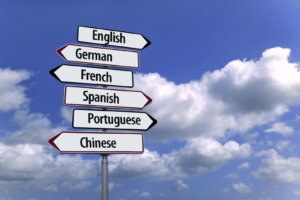 Thamsanqa Jantjie’s ‘performance’ at Nelson Mandela’s memorable service highlights the dangers of not using well-known, independent and experienced professional interpreters, writes Joyce Trocki.
Thamsanqa Jantjie’s ‘performance’ at Nelson Mandela’s memorable service highlights the dangers of not using well-known, independent and experienced professional interpreters, writes Joyce Trocki.
The role of the interpreter has come under the spotlight as South Africa continues to lure more foreign delegates to its shores. Most of the problems in the field of conference interpreting are due to the fact that professional and other conference organisers do not understand what interpreters do, how they work, the importance of using trained and experienced interpreters as well as sound providers, and where and how to find these experts.
DOWNLOAD 6 TIPS ON HOW BEST TO WORK WITH YOUR INTERPRETER AND/OR TRANSLATOR
IT IS NOT ABOUT PRICE
Organisers should look for the best interpreters and sound providers available and not shop around on price. Just because people can use two or more languages with some degree of skill does not mean that they can translate or interpret. Conference organisers should always use at least two interpreters for each language. Simultaneous conference interpreting is highly specialised and stressful work. This is why one will often find three interpreters per booth, or even four (two each way) and why they alternate.
RELIABLE EQUIPMENT
The best interpreters in the world cannot interpret what they cannot hear clearly and correctly. Interpreters need good, reliable equipment and technicians, as they must be able to hear clearly and to get their version out as quickly and coherently as possible. Conference organisers must ensure that the interpreters know and approve the sound provider. There must be a qualified technician in attendance at all times. The quality of the translation will be affected by unsuitable, inappropriate, poor and unsupervised sound equipment.
THE BOOTH
Some conference venues may have its own built-in interpreter booths. If not, you will need to build a soundproof one. Ensure that the booth is clean and free of dust.
The interpreting booth must be placed so that the door faces away from the delegates and can be left open at all times so that the interpreter get as much air as possible.
The booth should be placed so that the second interpreter is able to leave and enter the booth and conference room without disturbing the delegates and the speaker, ideally near a door. The booth should be situated so that the interpreters have a clear view of the screen and so that they can read what is on the screen.
DID YOU KNOW Translators translate documents and interpreters interpret speech
WORKING WITH INTERPRETERS
In order to ensure accurate interpretations, ensure that the interpreter works under the best possible conditions for maximum performance. Send copies of the programme, and documentation and copies of the speakers’ speeches to the interpreters before the conference. This will give the interpreters a chance to become familiar with the subject matter and the specialised terminology. Also remember: tired, hungry and thirsty, and uncomfortable interpreters can make mistakes.
WORKING WITH SPEAKERS
If speakers really want to get their messages across, they must pause at the end of every sentence and try to glance at the interpreters to see if they are coping with the pace. Speakers cannot slow down unless they pause.
DOWNLOAD INFOGRAPHIC: INTERPRETATION – FACTS VS FICTION
WORKING WITH DELEGATES
Each delegate must have a headphone for comments and questions in both languages. It is also important to advise delegates that there will be simultaneous interpreting. You can include the following in your conference programme: Please note that simultaneous interpreting services have been arranged for your conference. If you want the interpreter to do justice to your presentation, please remember to speak reasonably slowly and clearly so that the interpreter, who is following about half a sentence behind you, has time to understand what you are saying and to say this in the same way in the other language, with the same nuances, while storing and remembering at the same time what you are saying now.
Joyce Trocki is head and co-founder of the only network of professional translators and interpreters in central and Southern Africa, TINSA (Translators and Interpreters Networks of Southern Africa).




